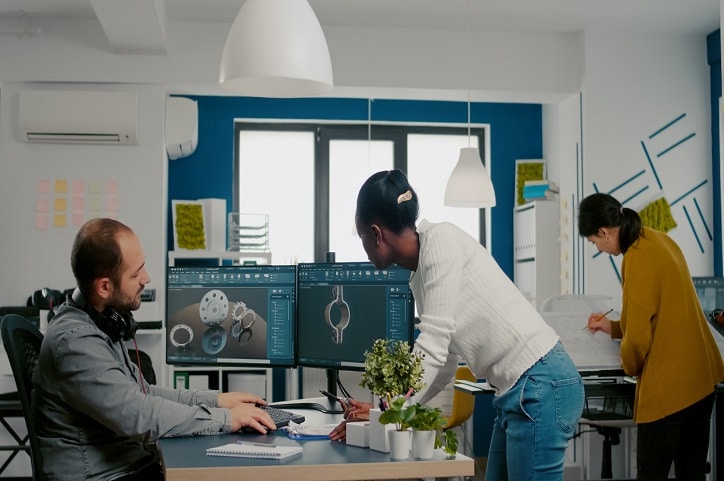It’s undeniable that the modern workplace is rapidly evolving due to technological advancements and changing work habits. Tech-integrated workspaces are increasingly becoming industry benchmarks, as they can streamline operations through enhanced productivity and greater employee well-being. It’s more crucial now than ever for employers and business owners to understand office furniture solutions for these modern workspaces, as they play an indispensable role in the competitive landscape.

Adaptability of Office Furniture
Modern work environments need flexibility to accommodate various work styles and preferences. Tech-integrated furniture like adjustable desks and modular seating arrangements allow employees to customize and rearrange workspaces to fit shifting needs.
This adaptability isn’t just about physical comfort but actually helps promote a dynamic work culture that can successfully pivot as new challenges arise. Adaptable workspaces can boost productivity since they more flexibly support diverse work activities and employee preferences.
Incorporation of Smart Technology
The incorporation of smart technology into office furniture is an important growing trend. Smart desks and chairs equipped with sensors can monitor usage patterns, ergonomic postures, and even environmental aspects of office life like lighting and temperature.
This data can help employers improve employee well-being, which, in turn, works to increase efficiency and productivity. For example, Herman Miller’s Live OS system integrates sensors into furniture to gather data on how spaces are used, providing insights that can lead to better space management and energy savings while helping employees feel more at home.
Collaboration Tools
Teamwork and collaboration are more central to workflows than ever before, and tech-integrated furniture solutions often include features like built-in video conferencing equipment, collaborative whiteboards, and wireless charging stations.
These tools help promote uninterrupted communication and collaboration among team members, regardless of their physical location. Research by Harvard Business Review has shown that organizations with highly collaborative environments that avoid placing too much burden on single individuals see significant improvements in team performance.
Sustainability in Modern Workspaces
Many companies are now prioritizing eco-friendly furniture solutions that minimize environmental impact. This includes using materials that are recyclable or have a lower carbon footprint, as well as designing furniture that can be easily disassembled and repurposed.
Businesses can align their workspace solutions with broader corporate social responsibility goals by choosing sustainable options. But perhaps the most salient point about sustainable furniture choices is the one that speaks to the bottom line: Green design features have been demonstrated to increase employee productivity substantially.
Employee Health and Well-being
Finally, the health and well-being of employees are paramount in the design of tech-integrated office furniture in Denver. Ergonomic features that promote good posture and reduce the risk of musculoskeletal issues are essential.
This includes adjustable chairs, sit-stand desks, and monitor arms that allow for proper screen positioning. Studies have shown that ergonomic furniture in the workplace can lead to a 40% reduction in employee absenteeism.
Conclusion
Tech-integrated workspaces represent the future of office furniture solutions, offering adaptability, smart technology, collaboration tools, sustainability, and ergonomic design. Employers and business owners who invest in these advanced solutions can expect to see significant improvements in productivity, employee satisfaction, and overall workplace efficiency. As the workplace continues to evolve, staying informed and proactive about these innovations will be key to maintaining a competitive edge.

